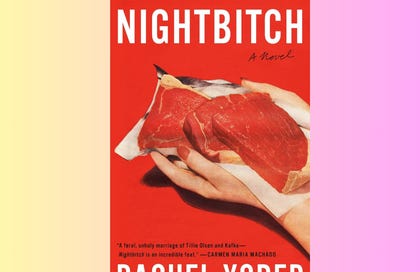Book Review: Nightbitch by Rachel Yoder (2021)
A deliciously frightening, fairy tale-laced look at American motherhood
It’s a story we know well: a woman gets pregnant, then feels torn between having a career and caring for her baby. The protagonist, named only as “the mother,” has walked away from her dream job running a community art gallery to care for her toddler son, but feels lonely and isolated. Her husband travels for work during the week, and is often too tired to parent when he’s home on weekends. The mother’s days are dictated by her son’s schedule and whims, and she feels trapped on the motherhood hamster wheel: be a “working mom,” or a mom who only “works” at motherhood? Join Mommy Classes and talk about nothing but Mommyhood, or struggle to connect with old friends who never do (or never seem to struggle)?
As if first-time motherhood isn’t overwhelming enough, the mother experiences a parallel identity shift: fur on her back. Sharper teeth. A bizarre craving to eat raw meat. The urge to set chase after small animals. She starts to become “Nightbitch,” a canine alter-ego. Or, is it? For as we follow the mother’s story, the line between reality and unreality is hazy. Is she really turning into a dog, or does she just perceive herself as dog-like? Mothering in a vacuum poses many questions and offers few answers. Much like waking up as a dog.
Nightbitch is a story we know, told in a way we’ve never seen.
Rage seethes beneath the surface. Fairy tale-like unreality depicts the overwhelm, confusion, and complicated joy that comes with caring for a toddler. The “meta” aspects of this dark comedy are wonderful; through the mother and her artist friends, we question authenticity, the value of art, and the difference between “performative” and “performance.” The mother can’t find a way to be both an artist and a mother, until Nightbitch shows her the way. Being Nightbitch is inconvenient, almost curse-like, but in the end, it’s the mother’s salvation, the identity that sets her free in all aspects of her life.
The-mother-as-Nightbitch does some shocking things, but it’s her judginess that makes her slightly difficult to root for, in some moments. When it comes to being less lonely, she seems like her own obstacle to fulfillment. But her snark is also important. Before Nightbitch, the mother didn’t complain. Or get outwardly angry. Nightbitch is a balm, an antidote to outward toxic positivity and under-the-surface passive aggression. There’s no easy solution to the challenges the mother faces, but being Nightbitch brings her back to her primal needs. In the end, she realizes a simple, obvious truth: to get help, she must ask for it. No one else will advocate for her needs.
Central to this story is the concept of identity. Who are we, when we live in a vacuum of recognition, support, and mirroring? Identity is deeply individual, but also a cultural construct. It’s easy to feel like a dog chasing one’s tail. Nightbitch overtly demonstrates this struggle on the community scale, but only leaves a few breadcrumb clues about the mother’s family.
There are loose ends in Nightbitch that might irk readers who like neat answers. The mother’s main source of comfort is a magical field guide, which feels more like a thematic device than an agent of change in the novel. At times, A Field Guide to Magical Women competes with Nightbitch for attention. If anything, though, it makes readers hungry for much more from Yoder.




